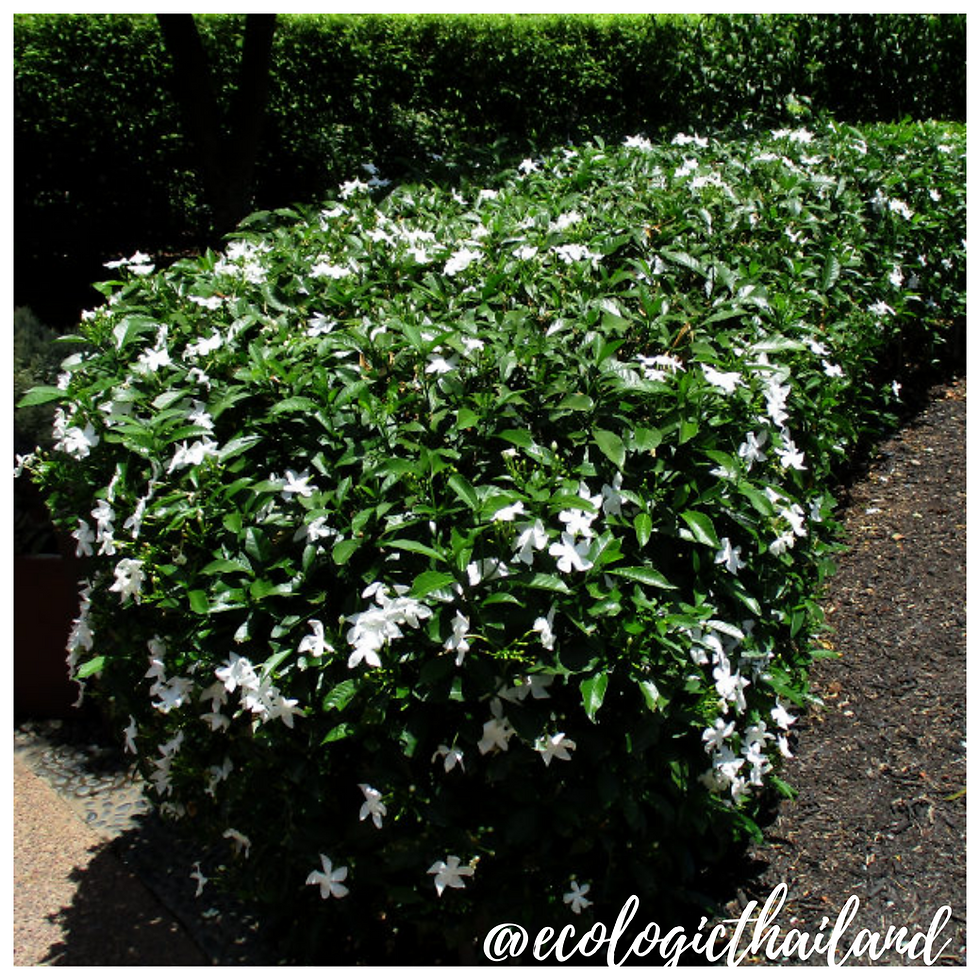Bird's eye chili
- Eco-Logic Resort
- Sep 26, 2020
- 3 min read
Updated: Sep 29, 2020
Phrik khi nok| พริกขี้นก | Capsicum annuum
Family: Solanaceae - Genus: Capsicum

Chili can be found in the gardens of the Thai Child Development Foundation and around the restaurant area on Mount Never-rest.
Bird's eye chili, bird eye chili, bird's chili or Thai chili is a chili pepper. It is used extensively in Thai cuisine , and because of this it is also known as Thai Chili.
The Thai name is Phrik Khi Nok (bird dropping pepper). This name is said to come the chili bushes being started by birds picking and dropping the chilis. Birds don’t feel any effects from chili oil therefore they don’t get the burning sensation humans do. The bird's eye chili is small, but is quite hot. It measures around 50,000 - 100,000 Scoville units.
About 90 days after the chili has flowered, the chilies change from green to red. They can be harvested both green or red, they color does not change the spiciness of the chili.

THE PLANT
The bird's eye chili plant is a perennial with small, tapering fruits, often two or three, at a node. The fruits are very pungent.
The plant can be 50 - 80 centimeter tall.

THE LEAVES
The green leaves of the bird's eye chili are 3 to 8 centimeter long and 2-4 centimeter wide.
The leaves are edible too. Cooking the leaves is also a must, you should never eat the leaves raw.

THE FLOWERS
The bird eye chili have tiny beautiful white flowers with blue stamens.
The flowers can be eaten as well as the tasty leaves.

THE FRUIT
The bird's eye chili is small, but is quite hot. It measures around 50,000 - 100,000 Scoville units, which is quite hot.
Green chilies are no less hot than red, in fact their pungency is about the same. What does differ is their sweetness, green chilies have a bit more bitter flavor.
Bird’s eye chilies come in a variety of colors, including vibrant red, green, yellow, and orange. Sometimes, you will also find black or purple varieties of these peppers. They are short and thin, usually two to three centimeters long by just half a centimeter wide. They only weigh two or three grams. The skin of these peppers is shiny and smooth to the touch, and the peppers are shaped like bullets. Each chili has 10 to 20 seeds.

THE SEED
Chili pepper seeds are actually NOT spicy, as they do not contain capsaicin, the chemical that makes peppers hot. Capsaicin is actually located within the whitish pithy pepper innards, the placenta, which you can remove to make the pepper milder in most cases. Pepper seeds might be coated with some of the oils from this pith, so if any heat will be from the pith, not the seeds themselves.
Removing the seeds includes removing the pith and thus any spice.
CULINARY USES OF BIRD'S EYE CHILI
In Thai cuisine, these chilis are highly valued for their fruity taste and extreme spiciness. They are extensively used in many Thai dishes, such as in Thai curries and in Thai salads, green as well as the ripe red chilis; or they can just be eaten raw on the side.
Birds Eyes are also dried and made into chili powder.
Click on the link of the Food Forest Kitchen to find some recipes using chili.
The leaves of the bird's eye chili are edible too. When boiled, the leaves a have mild leafy flavor mixed with a bit of sweet, a bit like spinach. Always pick the younger leaves. Cooking the leaves is also a must, you should never eat the leaves raw.
The flowers can be eaten too.
NUTRITION
Chilis are very low in calories and fat and very high in the antioxidant vitamin C.
They are also a good source of B-6. Studies are being done about the positive effects of capsaicin, the compound that makes peppers spicy, on certain health problems.
TRADITIONAL MEDICINAL USE OF BIRD'S EYE CHILI
NOTE: please take advice from a doctor if you are planning to use herbal medicine.
Birds eyes are used mostly for cooking but they can also be used as a natural insect repellent or pesticide when mixed with water.
In the past, the bird’s eye chili was used as a natural remedy for arthritis, toothaches, and rheumatism.
Chili is said to help you fall asleep fast, and to help you get a deeper sleep.
Bird eye chili are said to have the ability to decrease inflammation.
INTO THE WILD: a down to earth experience

For guests and visitors to Paksong we organize weekly tours "The Edible Forest" and Foraging weekends: Into the Wild. We work with local guides to take you in the jungle of Paksong. After foraging, we will cook a meal with the ingredients, using bamboo together with you!
Come and join and learn about the abundance of food that nature gives us!
INTO THE WILD!


















Comments